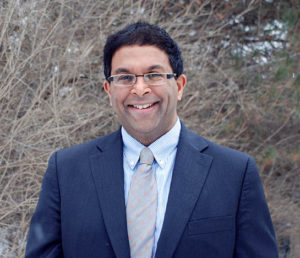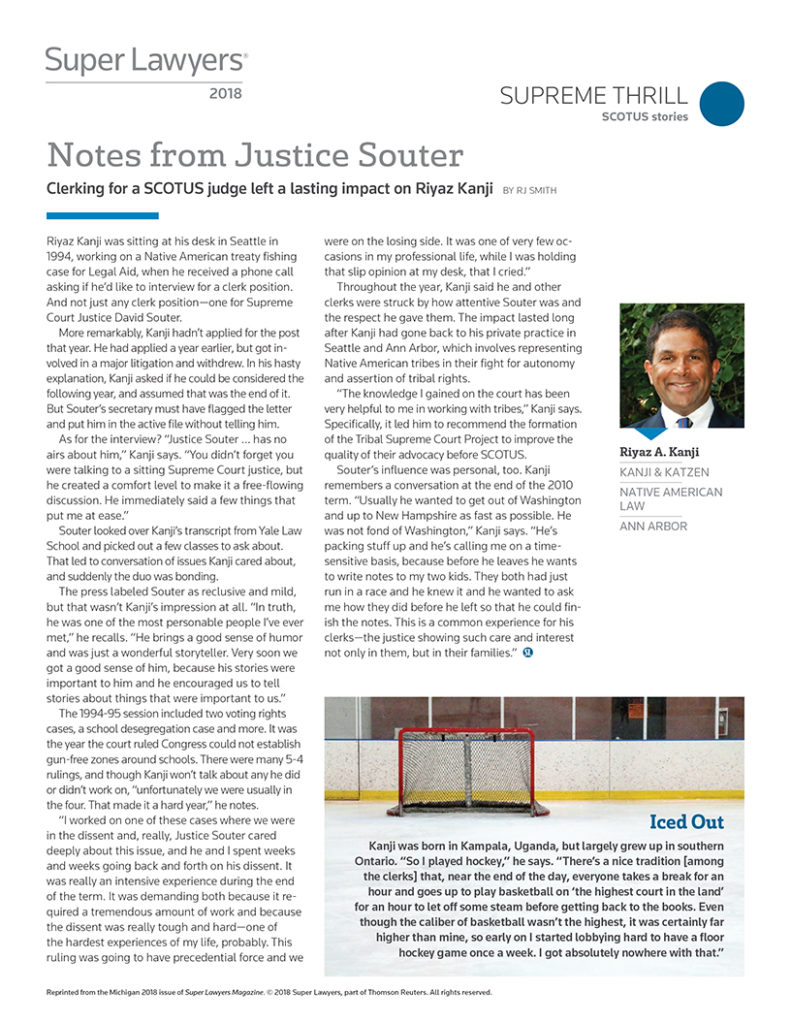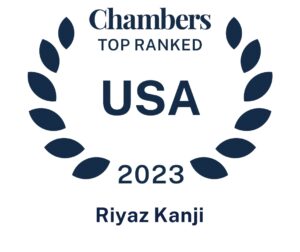
“Absolutely at the top, he is the consummate diplomat – there is nobody more skilled at navigating a matter with different personalities with large egos in a high-tension setting.”
“Riyaz is the most impressive lawyer I’ve ever encountered. His briefs are the best I’ve read in my life and his presentation is persuasive, authoritative and sympathetic.”
“[T]he leading Indian lawyer in the country.”
—Chambers USA
Riyaz Kanji is a founding member of Kanji & Katzen and the Directing Attorney for the firm’s Ann Arbor office. Riyaz may be contacted at rkanji@kanjikatzen.com.**
Education: Riyaz graduated from Harvard College with an A.B. in Social Studies in 1986 and received his J.D. in 1991 from Yale Law School, where he served on the Law Journal and won the Potter Stewart Prize in the Moot Court competition.
Awards and Honors: Riyaz is widely viewed as a leading trial and appellate litigator on behalf of Indian nations and tribes across the country. He is ranked by Chambers USA as the only “Star Individual” among Indian law practitioners in the United States. When interviewed by Chambers USA, commentators noted “He combines a deep knowledge of Indian law with a keen sense of how to craft a winning appellate argument. He is relentless in pursuit of his client’s interest, but manages to keep an even keel. Nothing ruffles him.”
Prior Experience: Riyaz served as a law clerk to the late Honorable Betty Fletcher of the United States Court of Appeals for the Ninth Circuit and Justice David Souter of the United States Supreme Court. Riyaz then spent two years as a Skadden Fellow at Evergreen Legal Services in Seattle, where he principally worked on the shellfish proceedings in United States v. Washington, and three years as an associate at Williams & Connolly in Washington, D.C., where, in addition to significant tribal representation, he litigated complex matters for clients including President Clinton, ABC News and Georgetown University.
Areas of Concentration: Riyaz’s practice encompasses a wide variety of issues vital to the preservation and enhancement of tribal sovereignty, including vindication of tribal jurisdictional and taxation authority, environmental protection, Indian gaming and other economic development matters, treaty hunting and fishing rights, reservation boundaries, and land claims.
For example, Riyaz has served as:
- Lead counsel (on brief and at argument) for the Muscogee (Creek) Nation before the United States Supreme Court in Carpenter v. Murphy (2019) and McGirt v. Oklahoma (2020), successfully defending the legal validity of the Nation’s 1866 reservation boundaries;
- Co-counsel for the western Washington Tribes before the United States Supreme Court in United States v. Washington (2018) (culverts subproceeding) (Ninth Circuit decision in favor of the Tribes affirmed by an equally divided Court);
- Co-counsel for the Mississippi Band of Choctaw Indians before the United States Supreme Court in Dollar General Corp. v. Mississippi Band of Choctaw Indians (2015) (Fifth Circuit decision in favor of Band affirmed by an equally divided Court);
- Lead counsel for the Little River Band of Ottawa Indians before the United States Court of Appeals for the Sixth Circuit in Kelsey v. Pope (2016), which became the first federal court to uphold tribal criminal jurisdiction over tribal members outside of Indian country;
- Lead counsel for the Seneca Nation of Indians before the United States Court of Appeals for the Second Circuit in CACGEC v. Chaudhuri (2015), affirming the Indian country status of the Nation’s lands and the legality of its gaming facility under federal law;
- Co-author of the amicus brief on behalf of the National Congress of American Indians (NCAI) in the United States Supreme Court in Michigan v. Bay Mills Indian Community (2013) (affirming the Tribe’s sovereign immunity from suit in an off-reservation dispute);
- Co-author of the amicus brief filed by NCAI regarding Congress’s authority to relax federal restrictions on tribal sovereignty in United States v. Lara (2004);
- Lead counsel for the Grand Traverse Band of Ottawa and Chippewa Indians before the United States Court of Appeals for the Sixth Circuit in GTB v. Office of U.S. Atty. (2004), upholding the legality of the Band’s Turtle Creek Casino;
- Lead litigator for NCAI and a coalition of Indian nations in successful efforts to require stricter federal regulation of mercury emissions by coal-fired power plants to reduce the contamination of waterways used by tribes for subsistence fishing;
- Lead counsel for the Seneca Nation in successful, ongoing efforts to protect the integrity of its court system from state interference, to preserve its sovereign immunity, and to vindicate its sovereign powers over its lands; and
- Testifying witness before both Houses of Congress on matters of vital importance to Indian nations across the country, including efforts to reduce the epidemic of domestic violence in Indian country, to improve the land-into-trust process, and to legislate a Carcieri fix.
Tribal Supreme Court Project: In addition to significant trial successes on behalf of the firm’s clients, Riyaz is frequently sought out as specialist counsel or as a consultant to Indian nations and their attorneys on matters of Supreme Court and appellate practice. He is passionate about the work of the NCAI-NARF Tribal Supreme Court Project and its role in protecting tribal sovereignty. He played an active part in the formation of the Project, serves as a Principal Advisor to it, and has devoted hundreds of hours of pro bono time to its work.
Community Service and Personal Interests: Riyaz enjoys playing ice hockey and running and he loves to coach youth sports, including soccer, ice hockey, and lacrosse (he has never allowed his lack of prowess in those sports to stand in the way of coaching them). He has also served as an Affiliated Professor at the University of Michigan Law School, where he has taught a seminar on Native American Law. He takes a keen interest in environmental issues, and serves on the Boards of the Ecology Center and the Michigan League of Conservation Voters.
Bar Memberships:
- Michigan State Bar Association
- Washington State Bar Association
- District of Columbia Bar Association
- Federal Bar Association
- United States District Courts for the District of Columbia, Western District of Michigan, Western District of Washington, and Western District of New York
- United States Courts of Appeal for the 1st, 2nd, 6th, 7th, 9th, 10th and D.C. Circuits
- United States Supreme Court
Presentations & Publications: Riyaz has lectured and spoken widely on Indian law issues, including at many of the country’s leading law schools, on numerous occasions at the Federal Bar Association’s annual Indian Law Conference, and with federal judges, including a 2008 address to a joint judicial conference of the United States Courts of Appeals for the 8th and 10th Circuits.
- Reflections on McGirt v. Oklahoma: A Case Team Perspective, 56 Tulsa L. Rev. 387 (2021) (with David Giampetroni and Philip Tinker).
From Super Lawyers Magazine:

**When sending an e-mail before an attorney-client relationship has been established, please do not include any confidential, secret or otherwise sensitive information. Unsolicited e-mails do not create an attorney-client relationship, and confidential or secret information included in such e-mails cannot be protected from disclosure.

